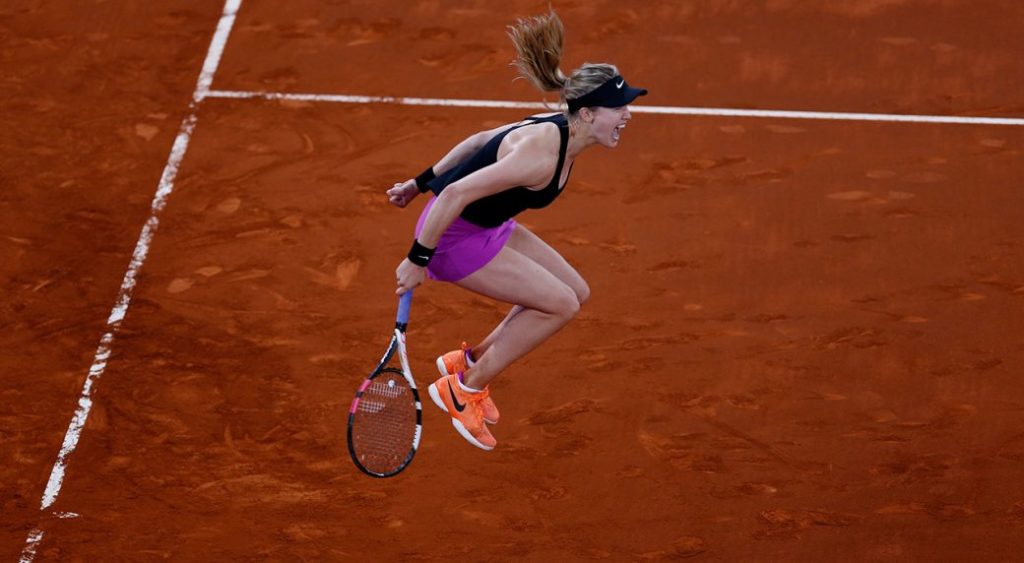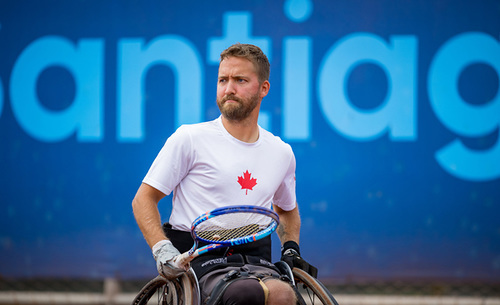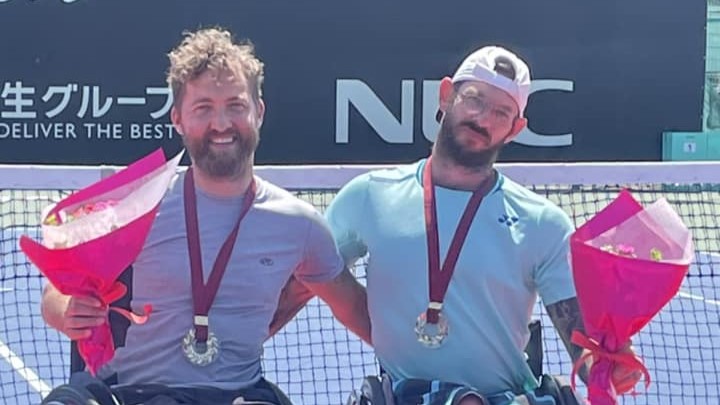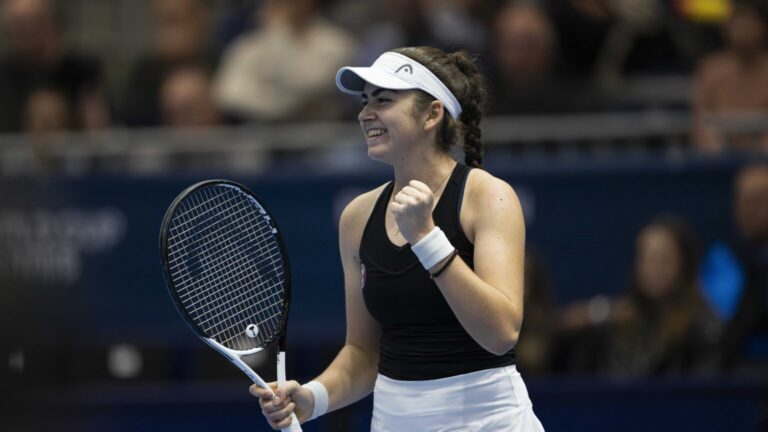
Skeptics can be forgiven for not expecting too much from Genie Bouchard when she faced Maria Sharapova in a second-round match at the Mutua Madrid Open on Monday.
Just four weeks ago she was playing in the $80,000 12th Annual Revolution Technologies Pro Tennis Classic in Indian Harbor Beach, Florida. There she barely defeated world No. 601 Brianna Morgan of the U.S. 6-2, 2-6, 6-4 in the first round and eventually lost 6-0, 6-3 in the quarter-finals to No. 896 Vicky Duval – though the latter American’s injury and illness issues are largely responsible for her unflattering ranking.
Bouchard then went to Istanbul, Turkey, for a WTA International level event and was beaten 6-0, 6-4 by No. 97-ranked Jana Cepelova of Slovakia.
She looked all at sea – at a nadir in terms of confidence – but then remarkably showed revitalized signs by beating No. 44-ranked Alizé Cornet 6-4, 4-6, 6-1 in the Madrid opening round on Saturday.
Her sensational level of play in Monday’s 7-5, 2-6, 6-4 victory over Sharapova was shades of Bouchard circa 2014. There was her tireless and athletic court coverage as well as her fearless going toe-to-toe from the baseline against awesome opposition like Sharapova.
At the moment, judging from her impressive return last week in Stuttgart, Sharapova may be the most daunting opponent in women’s tennis in the absence of Serena Williams, Victoria Azarenka and Petra Kvitova and the less than stellar recent showings of other top players such as reigning French Open champion Garbi e Muguruza and recent (and next week) world No. 1 Angelique Kerber.
On Monday, Bouchard was sharp right from the get-go and it came to mind that finally here was a match where there were few expectations of her, where the widely-held view was that Sharapova would be the winner and probably in convincing fashion.
During a run of five consecutive WTA losses after being beaten by No. 35-ranked Coco Vandeweghe in the third round of the Australian Open in January, Bouchard faced opponents who, based on her pedigree, she should have beaten. But versus Sharapova it seemed as if the burden of expectation was lifted and she was able to play much more freely.
The match was a thriller for almost all of its two hours and 51 minutes.
WHAT A SHOT! 😱
How did @GenieBouchard get this in?! pic.twitter.com/GSZNossdZ3
— wta (@WTA) May 8, 2017
From the Bouchard side, the above running forehand was probably the highlight of the evening – although a clean forehand winner on her second match point probably meant more – that was filled with drama and intensity.
“We just battled our hearts out,” was Bouchard’s eloquent post-match assessment. Late in the third set, her coach Thomas Hogstedt came on court to encourage her and strongly emphasized, “great fighting” and “you’re playing fantastic.”
There’s no doubt Bouchard got some help from Sharapova who had error-prone spells at key times during the match. As for the normally uber-aggressive Bouchard, she had fewer winners and fewer unforced errors than Sharapova. Her winners to unforced errors ratio was 20/27 while Sharapova was basically double on both counts – 44/49.
Most encouraging for Bouchard, who of late has had some confidence-destroying erratic streaks of her own during matches, she was more consistent in the rallies and wasn’t intimidated by the 30-year-old Russian’s big-time bashing from the backcourt.
Everyone knows about the highly-publicized edge to the match resulting from Bouchard calling Sharapova a “cheater,” referencing her 15-month drug ban, during an interview in Istanbul two weeks ago.
Both players probably should take some responsibility for the battle lines that were drawn on the matter. The Bouchard judgment seems a little harsh if one believes Sharapova that her taking Meldonium at the 2016 Aussie Open was unintentional because she wasn’t aware it had been banned as of January 1. She has also claimed that Russians take Meldonium the same way Americans pop Aspirins.
On the other hand, it seems strange that Sharapova failed to list Meldonium on forms, over many years, of the drugs that she was taking and also did not inform her doctor or her fitness coach that she was taking it. As well, that she took it before all five matches she played at the 2016 Australian Open raises suspicions.
Bouchard apparently had many of her WTA peers on her side on Monday and said after the match, “I was actually quite inspired before the match because I had a lot of players coming up to me privately wishing me good luck – players I don’t normally speak to (and) getting a lot of texts from people in the tennis world that were just rooting for me. So I wanted to do it for myself, but also all these people. I really felt support. It showed me that most people have my opinion, and they were just maybe scared to speak out.”
Both players made an effort to say the match was about tennis. But on game point in the very first game when Sharapova approached a short ball on the backhand with Bouchard near the net and drilled it right at her, it certainly felt like ‘game on.’
“Obviously, there was a lot going on besides tennis in this match,” Bouchard said. “As soon as I stepped on the court, I really just wanted to make it about tennis. We both did that.”
Ever the tried-and true professional – and she deserves credit for looking Bouchard right in the eye during the civilized handshake at the net – Sharapova commented, “everything that surrounds myself, I don’t pay attention to much of it. I’ve been part of this game for many years. I know what the drill is.”
The drill for her now is that with the 65 points from her first-round win over Mirjana Lucic-Baroni on Sunday, her current No. 258 ranking will rise to about No. 210, which should be good enough for entry to the Wimbledon qualifying. And she has next week’s Italian Open in Rome where she will need to get to the semifinals (350 points) in order to guarantee a spot in the main draw at Wimbledon with its entry cut-off date of May 22.
As for Bouchard, she did not make the Rome cut-off and will not be there next week but will play in Nuremburg, Germany, the following week, which is a week before Roland Garros. Nuremberg happens to be the only WTA tournament Bouchard has won – beating Karolina Pliskova in the 2014 final.
Next for Bouchard in Wednesday’s third round will be top-seed Kerber. The world No. 2 won their last encounter – 6-4, 6-2 at the 2016 Rio Olympics – but Bouchard leads their head-to-head 3-2. A lot has changed for both players since that match in Brazil last August. On Monday Kerber had to come from 3-5 down in the final set to beat No. 37-ranked Katerina Siniakova of Czech Republic 6-2, 1-6, 7-5 in her opening match.
The 29-year-old German is just 18-10 so far in 2016 and has not won a title. It will be a different match for Bouchard (9-9 this year) than against the relentlessly up-tempo Sharapova because Kerber is a better mover and more of a counter-puncher. Bouchard did have a run of good form in Sydney (three rounds) and at the Australian Open (two rounds and then a tough 6-4 in the third loss to Vandeweghe) earlier this year. If she is able to reproduce anything like the tennis she did against Sharapova on Monday, Wednesday’s match-up has to be viewed as a very even contest.
How bow dah pic.twitter.com/SOAcpEWflu
— Genie Bouchard (@geniebouchard) May 8, 2017
“I’ve been putting in the hard work,” Bouchard said Monday. “I’ve had a tough couple of months but it’s been two matches now where I see the results on the match court. So I just want to keep that going.”
Caution is the watchword when assessing Bouchard right now. But her fans can be forgiven for getting their hopes up after she finally – after four tries – has beaten the woman who was once her idol and, way back when, originally inspired her to have ambitious intentions for her own tennis game.
MILOS ON THE WAY BACK
Milos Raonic played the ATP 250 tournament in Istanbul last week, his first event since withdrawing from the Miami Open in late March with a nagging right hamstring injury.
Playing in his first clay court event of the year, and ultimately in the first clay-court final of his career, he won three rounds before losing 7-6(3), 6-3 to Marin Cilic.
Generally Raonic didn’t play at his best level but he showed a lot of grit in eking out an opening-round win 6-7(5), 6-3, 7-6(3) over Aljaz Bedene and a 7-6(4), 7-6(6) quarter-final victory over Bernard Tomic.
After beating Viktor Troicki 6-2, 6-3 in the semifinals, with his forehand firing particularly well as it did most of the week, Raonic had an injury issue during the final.
Leading 6-5 on serve in the first set against Cilic, he took a medical time-out to have a right elbow problem examined. He later explained, “I just over-extended at one point and I don’t know what it was exactly – the bone hitting the bone or the bone hitting some tendon? After that it was uncomfortable to extend my arm. That’s why I served a little bit slower for the rest of the match.
“I struggled a little bit to get a consistent pace. I felt like I was serving a bit slower – about 190 when instead of it usually being 210 or 220.”
Raonic, seeded No. 5, doesn’t play his first match in Madrid until Wednesday, so he will hope to be over any elbow issue when he faces either Gilles Muller or Tommy Haas.
POSPISIL AND WOODFORDE SPLIT
Vasek Pospisil and his coach Mark Woodforde, the 51-year-old Australian who won six Wimbledon doubles titles (with compatriot Todd Woodbridge) and ranked as high as No. 19 in singles, have parted ways.
“After five months together, Mark Woodforde (above with Pospisil’s parents Mila and Milos) and I have stopped our professional partnership,” Pospisil posted on Twitter Sunday. “I would like to thank Mark for his efforts and expertise during this time and wish him and his family the best for the future.”
While the pair didn’t have the success they had probably hoped for, Pospisil did score a career-achievement win over world No. 1 Andy Murray at Indian Wells and his No. 133 ranking has risen to No. 107 since the beginning of the year.
That current No. 107 would put him close to the entry cut-off of No. 104 for Wimbledon, with the cut-off date being May 22nd, a week from next Monday.
But it appears, if Wimbledon is anything like the French Open, the cut-off will be higher than 104. Six players (injury-protected rankings in brackets) are using protected rankings for Roland Garros: Tommy Robredo (57), Thanasi Kokkinakis (81), John Millman (81), Dmitry Tursunov (89), Ricardas Berankis (93) and Jerzy Janowicz (94). That has brought the cut-off up to No. 98.
"French-Canadian" dinner in Seoul. @felixtennis @fredfontang pic.twitter.com/O8BBQLdAr3
— Vasek Pospisil (@VasekPospisil) May 8, 2017
This week Pospisil is into the second round of the $100,000 Challenger in Seoul, Korea, and will next play Duckhee Lee of Korea.
In the tweet above in Seoul he is with Félix Auger-Aliassime and Tennis Canada coach Fréderic Fontang (Pospisil’s former coach).
The 16-year-old Auger-Aliassime, a qualifier, is also into the second round and will face No. 3 seed Dudi Sela of Israel on Wednesday.
Feature photo courtesy of: Associated Press





